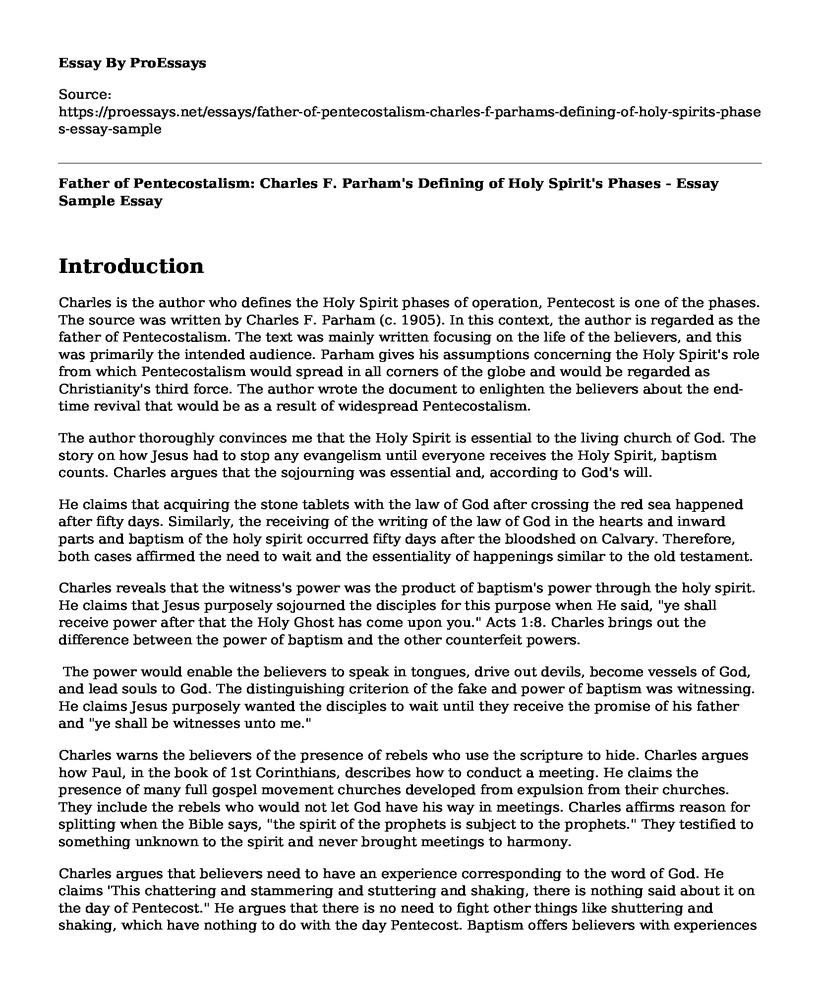Introduction
Charles is the author who defines the Holy Spirit phases of operation, Pentecost is one of the phases. The source was written by Charles F. Parham (c. 1905). In this context, the author is regarded as the father of Pentecostalism. The text was mainly written focusing on the life of the believers, and this was primarily the intended audience. Parham gives his assumptions concerning the Holy Spirit's role from which Pentecostalism would spread in all corners of the globe and would be regarded as Christianity's third force. The author wrote the document to enlighten the believers about the end-time revival that would be as a result of widespread Pentecostalism.
The author thoroughly convinces me that the Holy Spirit is essential to the living church of God. The story on how Jesus had to stop any evangelism until everyone receives the Holy Spirit, baptism counts. Charles argues that the sojourning was essential and, according to God's will.
He claims that acquiring the stone tablets with the law of God after crossing the red sea happened after fifty days. Similarly, the receiving of the writing of the law of God in the hearts and inward parts and baptism of the holy spirit occurred fifty days after the bloodshed on Calvary. Therefore, both cases affirmed the need to wait and the essentiality of happenings similar to the old testament.
Charles reveals that the witness's power was the product of baptism's power through the holy spirit. He claims that Jesus purposely sojourned the disciples for this purpose when He said, "ye shall receive power after that the Holy Ghost has come upon you." Acts 1:8. Charles brings out the difference between the power of baptism and the other counterfeit powers.
The power would enable the believers to speak in tongues, drive out devils, become vessels of God, and lead souls to God. The distinguishing criterion of the fake and power of baptism was witnessing. He claims Jesus purposely wanted the disciples to wait until they receive the promise of his father and "ye shall be witnesses unto me."
Charles warns the believers of the presence of rebels who use the scripture to hide. Charles argues how Paul, in the book of 1st Corinthians, describes how to conduct a meeting. He claims the presence of many full gospel movement churches developed from expulsion from their churches. They include the rebels who would not let God have his way in meetings. Charles affirms reason for splitting when the Bible says, "the spirit of the prophets is subject to the prophets." They testified to something unknown to the spirit and never brought meetings to harmony.
Charles argues that believers need to have an experience corresponding to the word of God. He claims 'This chattering and stammering and stuttering and shaking, there is nothing said about it on the day of Pentecost." He argues that there is no need to fight other things like shuttering and shaking, which have nothing to do with the day Pentecost. Baptism offers believers with experiences discussed in the second chapter of Acts.
Conclusion
In conclusion, the Pentecost account in Acts chapter two, affirms holy spirit baptism through speaking in other languages. This phase was to play a vital role in the spread after the revival at Azusa Street in Los Angeles. Charles reveals the origin of Pentecostalism and the counterfeit power among the believers. The message he conveyed was characterized by diversity and was essential for the spread all over the world.
Reference
Charles F. Parham (1905). Sources for the Study of North American Religion: Pentecostalism The Baptism of the Holy Spirit (1630 – 1950).
Cite this page
Father of Pentecostalism: Charles F. Parham's Defining of Holy Spirit's Phases - Essay Sample. (2023, Aug 13). Retrieved from https://proessays.net/essays/father-of-pentecostalism-charles-f-parhams-defining-of-holy-spirits-phases-essay-sample
If you are the original author of this essay and no longer wish to have it published on the ProEssays website, please click below to request its removal:
- The Early Reformation by Martin Luther. Religion Essay Example
- Full Content Sermon Outline - Course Work Example
- Forgiveness Is Important as It Is a Way of Getting Support From God - Paper Example
- Critical Essay on Creation Regained by Albert Wolters
- Article Analysis Essay on Spirituality and Religion in Counselling
- Why I Am Not a Christian Essay Example
- Paper Example on Ethical Relativism: Varying Perspectives on Morality







